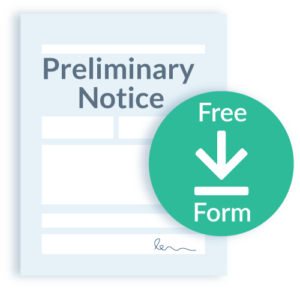Private projects
General contractors are not required to send notice in Connecticut.
However, it is advised to file an affidavit with the county clerk within 15 days of commencing work.
General contractors are not required to send notice in Connecticut.
However, it is advised to file an affidavit with the county clerk within 15 days of commencing work.
General contractors are not required to send notice on public projects in Connecticut.
Since GCs will not make a claim against their own bond for non-payment, they do not have bond claim rights, and have no preliminary notice requirement.
Subcontractors and suppliers are not required to send preliminary notice on private projects. However, a notice of intent should be sent before filing a mechanics lien.
Notices of intent are sent within 90 days after ceasing work and filing a lien claim.
Parties who remain unpaid 30 days after their hiring party is paid for the work the claimant provided must provide notice to the hiring party in order to gain protections.
Notice may be given at any time until the time has passed in which a suit to recover against the bond has elapsed.
Connecticut does not require any notice prior to performing work on a private project.
However, the general contractor is allowed to file an affidavit with the town clerk in the town in which the property is located. If properly filed, subcontractors and suppliers are required to serve a copy of the notice of intent to lien on the general contractor, as opposed to just the property owner.
All lien claimants who do not have a direct contractual relationship with the property owner must provide a Notice of Intent to Lien to the owner (and the original contractor if an affidavit was filed with the town clerk).
• We explore these requirements here: Connecticut Notice of Intent FAQs & Guide.
The affidavit filed by the original contractor must be filed within 15 days from the commencement of work to have the effect described above.
The Notice of Intent to Lien must be filed within the 90-day period in which a Certificate of Lien may be filed (within 90 days of ceasing work) and prior to the filing of the Certificate of Lien.
The original contractor’s affidavit is to be filed in the office of the town clerk in the town in which the subject property is located.
The Notice of Intent to Lien must be sent to the property owner, and, if the general contractor properly filed an affidavit, then to the GC as well.
The original contractor’s affidavit is to be filed with the town clerk in the town in which the subject property is located.
Connecticut rules for serving the Notice Intent to Lien are complex and strict.
A general contractor’s affidavit must include the following information pursuant to Conn. Gen. Stat. §49-35(a):
• The general contractor’s business name;
• The general contractor’s business address;
• Description of the property; &
• Signed in front of a notary.
The affidavit is not a required filing in Connecticut, so the original contractor’s lien rights are not affected by the failure to file an affidavit. However, if the original contractor does not file an affidavit he is not entitled to be served with a copy of a subcontractor’s, supplier’s, or materialman’s Notice of Intent to Lien.
It depends.
Bond Claim/Contract Funds
Subcontractors and suppliers who remain unpaid after their hiring party is paid for the work the claimant provided may provide notice to the hiring party. Failure of the hiring party to pay within 10 days of receiving the notice may result in 1% interest per month being added to the amount due.
Furthermore, the claimant may request that the hiring party place the funds in an interest-bearing escrow account – failure to do so may result in the hiring party being held liable for the claimant’s attorney’s fees.
Claims Against State
No notice is required for a general contractor to make a claim for nonpayment against the public entity.
Bond Claim/Contract Funds
The notice must be received more than 30 days after the hiring party receives payment for the labor and/or materials furnished by the claimant.
Claim Against State
N/A
Bond Claim/Contract Funds
The notice must be given to the party that hired the claimant. If the claimant was hired by a subcontractor, it may be advisable to also provide a copy of the notice to the general contractor.
Furthermore, this notice can be effective as a notice of a claim against the payment bond in CT if it includes additional information and sent to the surety.
Claim Against State
N/A
Bond Claim/Contract Funds
The notice to secure interest, request funds to be deposited in an escrow account, and to be effective as a claim against the payment bond, notice should include:
• Claimant’s information;
• Amount claimed;
• Statement demanding funds be deposited in an escrow account (if desired)
• Hiring party’s information; &
• Description of the property.
Claim Against State
N/A
Bond Claim/Contract Funds
The notice must be sent via registered or certified mail.
Claim Against State
N/A
Bond Claim/Contract Funds
Notice cannot be late unless given after the time has passed for a suit to be initiated; which in CT is one year from the last date of furnishing labor and/or materials to the project.
Claims Against State
N/A
First, filing a lien under the circumstances you present is problematic. There are strict deadlines for noticing intent and recording your lien. Sounds to me like this is an afterthought and not within 4 months of your last date of work, but perhaps I'm wrong there. In any event, if you're seeking items from two years ago, I doubt that would go well for you under a mechanic's lien theory of recovery.
Second, it doesn't sound like there was much of an arrangement between you and the owner, this was something you were doing to improve the residence you were living in.
Third, if you're broke, what good is the mechanic's lien anyway? Even if it were valid, you'd still need to take action on it to pursue it. If they've just refi'd, I imagine the property is encumbered to a not-insignificant extent. The loan already closed, so presumably they aren't going to refi again or sell very soon. If you don't have the money to pursue a wrongful eviction, foreclosure likely isn't within your current financial ability to pursue. If you aren't going to foreclose, then you still have other claims and remedies, but I'd think you'd handle most of those claims and damages within a wrongful eviction case, should you ever have the means to pursue that case.
Most likely your best course of action at this point would be a demand letter and potentially a breach of contract action against the GC who has not paid you. If there is a payment bond on the project your may still have time to make a claim against this bond. But otherwise, because you did not send preliminary notice, you would not have lien rights.
Connecticut does not require any notice prior to performing work on the project. However, the general contractor is allowed to file an affidavit with the town clerk in the town in which the property is located. If the affidavit is properly filed within 15 days after commencement of work, subcontractors and suppliers are required to serve the original contractor (in addition to the property owner) with a copy of any notice of intent to file a lien.
All lien claimants who do not have a direct contractual relationship with the property owner must provide a Notice of Intent to Lien to the owner (and the original contractor if an affidavit was filed with the town clerk) within the 90-day period in which the Certificate of Lien must be filed, and before filing the Certificate of Lien.

The generic notice form can be used in Connecticut, or any other state where notice is not required. It provides information about your company to the property owner, general contractor, and other parties in charge of payment on a construction project.

Next, fill out the form completely and accurately. Property owners and general contractors often rely on this document to communicate with you, and making mistakes on this form can cause payment delays.

Since Connecticut doesn’t have any preliminary notice requirement, there are no specific rules for delivery. Deliver your notice however you see fit.
Select Preliminary Notice document.
Provide basic job information.
Levelset sends the document for you. Postage included!